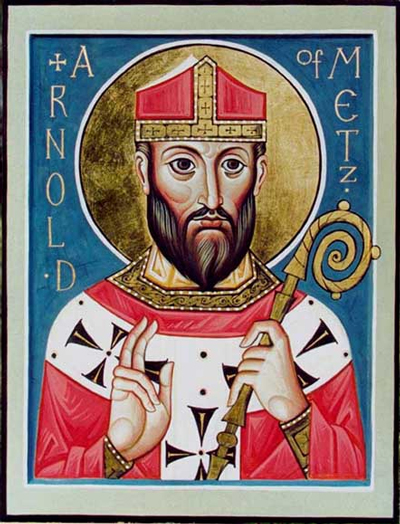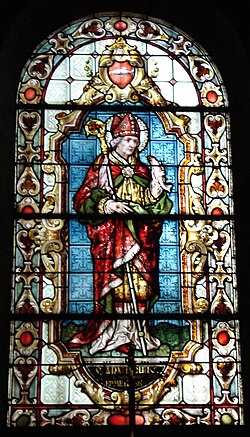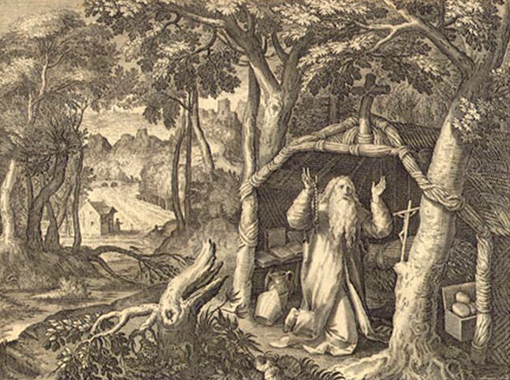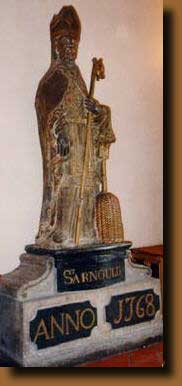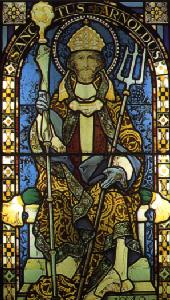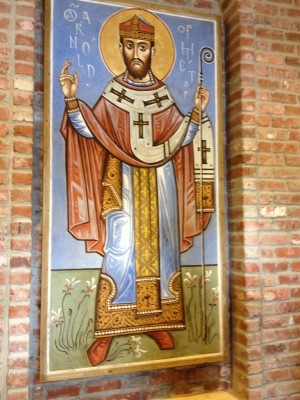Arnulf of Metz
Arnulf of Metz, French Arnoul de Metz, also Saint Arnould, Arnoulf (* August 13 582 in Lay -Saint -Christophe in Nancy; ? † July 18 probably 640 at Remiremont ) was the progenitor and house saint of the Carolingians. From 614-629 he was bishop of Metz.
Life
About Arnulf's ancestors, including his parents nothing is known (see also: Incorrect Merovingian ). He reached a high position in Theudebert II of Austrasia. 612 Arnulf of Metz was ordained a priest after his wife had entered a convent. 614 he was made bishop of Metz, but kept his political offices at.
Together with Pippin the Elder. he laid the foundation stone for 613 the rise of the later Carolingians, by King Clotaire II of Neustria called the against the ruling in Austrasia and Burgundy, widow of King Sigibert I., Brunechildis to help. After her fall Chlothar ruled henceforth all over the empire, but had to acknowledge in Edictum Chlotharii the power positions of the Austrasian nobility.
Arnulf made henceforth indispensable as a consultant at the court of Chlothar. As 623 Chlothar five year-old son Dagobert I. was appointed to the sub- king in Austrasia in the year, Arnulf took over the influential position his tutor. However, after he and Pippin largely declining as their influence, as Scrooge 629 moved to Neustria, to take up its authority throughout the Frankish kingdom, he put his bishop resign and he retired to the Abbey Remiremont in the Vosges, where he used lepers and probably 640 died. He was first buried at his place of death, but later in the church of the Abbey of St. Arnulf reburied in Metz.
Progeny
Arnulf of Metz had two sons from his marriage:
- Chlodulf, who also became bishop of Metz 660
- Ansegisel, the 662 is occupied, was slain before 679. He married Begga, the daughter of Pepin and dropped this marriage the foundation for the rise of the Carolingians.
Legends
Arnulf of Metz is venerated in the Catholic Church as a saint. He is the patron saint of brewers and millers to the many legends. On it you turn to when you've lost something.
His election as bishop
Arnulf felt after entering his wife Doda to the convent as well as in his own ordination by far not worthy to accept the bishopric of Metz, after he had been elected. A simple life as a monk he would have preferred, reports the biography. In order to be sure that it was God who had appointed him to this post, he threw his bishop's ring in the Mosel and prayed that God would give him the ring back if he should accept it. The next day at lunch fish was served. As Arnulf the fish sliced for consumption, the bishop's ring came again to the fore, he had the day before thrown into the Moselle. Arnulf interpreted this as a sign from God. He did not hesitate and accepted the bishopric of Metz.
The beer miracles during his lifetime
According to tradition suffered in the time of Arnulf bishop of Metz, the region from the effects of polluted water. Arnulf realized that boiled water, as it is used in the brewing process, reduced this risk. To the legend, he threw a crucifix in a beer boiler and blessed them. People drank beer only from this blessed boiler and the disease wave went back. The saying to distribute the beer so blessed to have been: "By the people work and God's love beer sees the face of the world. "
Beer miracle in the transfer of his remains
After his death, his successor in the episcopate Goericus wanted to pick the bones out of the monastery Remiremont back to Metz. The Holy description tells that there was a major miracle. For when the solemn procession in the summer heat, July 18, moved through the streets, the procession in the village of Champignuelles had to stop because the heat and burden of the bones was no longer bearable. As people came in the only inn, there was not counting only a tankard of beer for all, 5000 men, women and children. So all shared this tankard, each drank and hoped for the intercession of the already revered as a saint bishop Arnulf. The miracle happened: all drank and never this tankard was dry beer.

